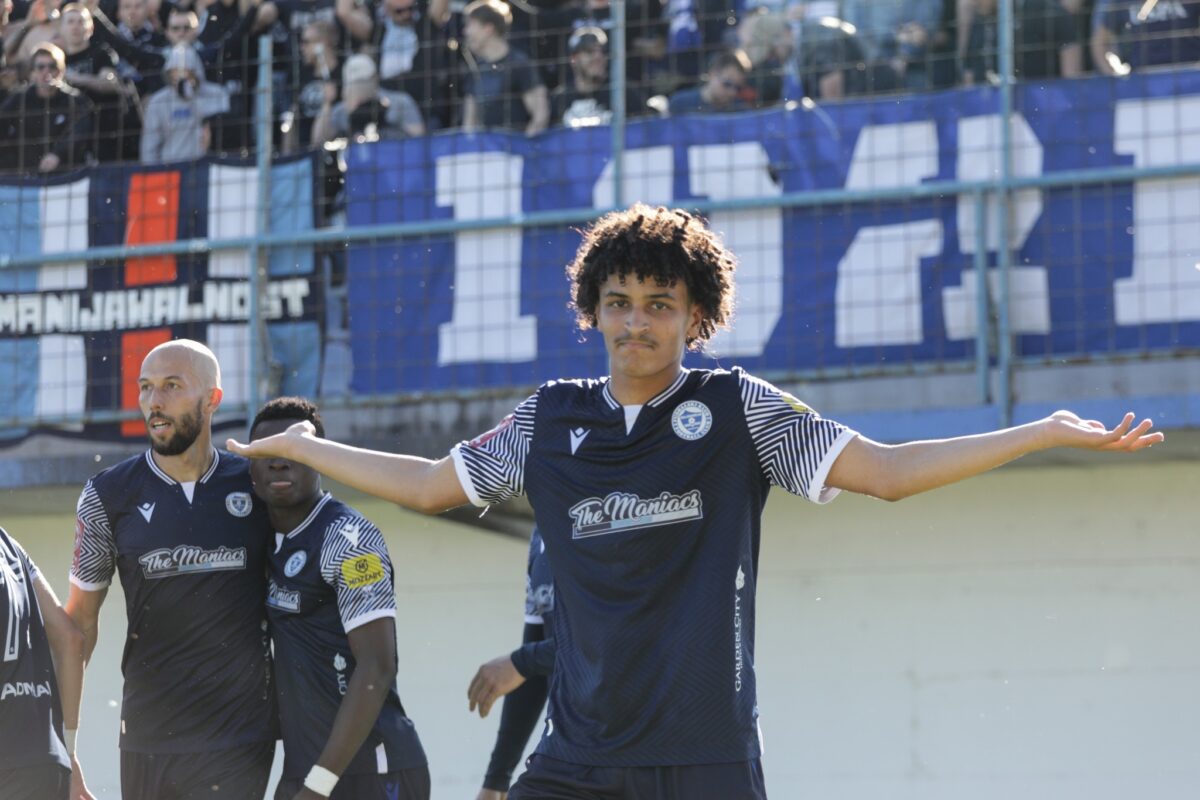Re: FK Željezničar
Evo kone su dobru stvar napravile sa kartama. Ulaz za djecu 3 KM sto je odlicno
-

- Plava Porodica
- Postovi: 14819
- Pridružen/a:
- Kontakt:
- Status: Offline
Re: FK Željezničar
Eo ga opet o cijenama.
Sve se iste teme vrte samo jednu noc jedni, drugu noc drugi akteri
Sve se iste teme vrte samo jednu noc jedni, drugu noc drugi akteri
Babukini moleri !
AMAR AMAR OSIM OSIM !!!
AMAR AMAR OSIM OSIM !!!
Re: FK Željezničar
Poenta je daniko pojma nema i svi nagadjate oko tog mehanizma solidarnosti. Ali kako pise i kako logika nalaze ako igrac ide za odredjenu cifru iz kluba u klub taj mehanizam se aktivira i klubovi koji su tog igraca "proizveli" dobiju dio kolaca. I nebi trebalo da ima veze da li je igrac promjenio drzavu.
Sad da li je ovako ili ne necemo saznati dok neki od nasih igraca ne promjeni zvanicno sredinu u kojoj igra.
Sad da li je ovako ili ne necemo saznati dok neki od nasih igraca ne promjeni zvanicno sredinu u kojoj igra.
https://SecreLocal.com - Live Dating Site - No Verify - Anonymous Sex Dating - [url=https://SecreLocal.com/girls.html] Dating Local Singles [/url]
Re: FK Željezničar
Spoiler:
Spoiler:
Spoiler:
A ne znam što se mučim kad ima ovih što sve znaju
Re: FK Željezničar
Večeras nakon jacije idemo o stepenicama i kaznama aBdPlava Porodica je napisao/la: ↑pon jul 03, 2017 5:35 pmEo ga opet o cijenama.
Sve se iste teme vrte samo jednu noc jedni, drugu noc drugi akteri
Re: RE: Re: FK Željezničar
I Kemo radi visine umjesto Lendrica.skretnicar je napisao/la:Sta ocekujete u Podgorici? Hocel' slavko igrati bunker i pokušavati na kontre ili cemo izaci duboko i traziti rani pogodak ? Upute Edisa bi nam sad mogle dosta pomoci, hasanovic i ugljesa na vezne i ispred njih zeric. Sjeckati igru sitnim prekršajima ... također pokušavati s distance koliko god se moze, onaj golman je kriza i to bi trebali iskoristiti.
Poslano sa mog HTC Desire 828 koristeći Tapatalk
Mi ćemo opet doći!
Doći ćemo opet u sjaju sunca.
Što se već sada rađa.
Zbijeni k'o mrka teška prijetnja
i s razvitim jedrima nove snage.
Doći ćemo opet u sjaju sunca.
Što se već sada rađa.
Zbijeni k'o mrka teška prijetnja
i s razvitim jedrima nove snage.
Re: FK Željezničar
Vjerujem da cemo izaci oprezno i u istom sastavu. Mozda jedino pocne Markovic umjesto Ugljese. Treba sutati iz daljine, definitivno. Golman im je fakat kritican bio na Grbavici.
"Situacija je bila bremenita, njegova ljubav neupitna, a on na platnom spisku. Imao je podršku svakog normalnog hroničara društvenih zbivanja." - Lav Nikolajevič Tolstoj
-

- SIMA_SIMAU
- Postovi: 7332
- Pridružen/a:
- Kontakt:
- Status: Offline
Re: FK Željezničar
0:1 poluvrijemeskretnicar je napisao/la: ↑pon jul 03, 2017 5:43 pmSta ocekujete u Podgorici? Hocel' slavko igrati bunker i pokušavati na kontre ili cemo izaci duboko i traziti rani pogodak ? Upute Edisa bi nam sad mogle dosta pomoci, hasanovic i ugljesa na vezne i ispred njih zeric. Sjeckati igru sitnim prekršajima ... također pokušavati s distance koliko god se moze, onaj golman je kriza i to bi trebali iskoristiti.
Za slavnu prošlost, kroz tešku sadašnjost, za bolje sutra, nek’ ne fali volje za ljubav što se Željezničar zove.
Re: FK Željezničar
Nema tema, a korisnici prave rokaduPlava Porodica je napisao/la: ↑pon jul 03, 2017 5:35 pmEo ga opet o cijenama.
Sve se iste teme vrte samo jednu noc jedni, drugu noc drugi akteri
Re: FK Željezničar
Rutinski 0:2
Re: FK Željezničar
U Podgorici ocekujem da nasi momci preoru teren.Da ih izadje 11 a da imam osjecaj da ih je 14 na terenu.Da ginu,da grizu zadnji atom snage da daju od sebe.Treba nam prolazak dalje zbog 1000 i jednog razloga.Zbog mira u kuci,zbog dusmana,zbog love,zbog juga nadam se da su i oni svjesni toga i da nas nece razocarati.
Re: FK Željezničar
Moze jozinho Kemo on je rodjeni napadač, treba samo vidjeti još kakvog kadeta da gurnemo.
Poslano sa mog HTC Desire 828 koristeći Tapatalk
Poslano sa mog HTC Desire 828 koristeći Tapatalk
Mi ćemo opet doći!
Doći ćemo opet u sjaju sunca.
Što se već sada rađa.
Zbijeni k'o mrka teška prijetnja
i s razvitim jedrima nove snage.
Doći ćemo opet u sjaju sunca.
Što se već sada rađa.
Zbijeni k'o mrka teška prijetnja
i s razvitim jedrima nove snage.
-

- Jaozinho22
- Postovi: 2746
- Pridružen/a:
- Lokacija: Baza
- Status: Offline
Re: FK Željezničar
Može li Hasanović il ćemo čekat da dobije 30 kg ?
KLUB NAJVEĆI,
NAVIJAČI NAJBOLJI,
Gospodine Adžeme, ne dozvolite da ''neko'' pere svoj prljav veš preko Vas !
,,To je naš stadion, mi svaki put dajemo onoliko koliko mi smatramo da trebamo dati ! KRAJ PRIČE''
Amar Osim.
NAVIJAČI NAJBOLJI,
Gospodine Adžeme, ne dozvolite da ''neko'' pere svoj prljav veš preko Vas !
,,To je naš stadion, mi svaki put dajemo onoliko koliko mi smatramo da trebamo dati ! KRAJ PRIČE''
Amar Osim.
Re: FK Željezničar
Fkt raja prica da su depilirani i Šiljak videni u golf klubu gore.. Isto se prica da je menadžer depiliranog vidjen na Grbavici pred kraj prvenstva.. Isto se prica da je on voljan doci kod nas ako mu propadne inostranstvo.. Gdje ima dima i vatre..
Na jugu stojimo, zastave vijemo, barjake dižemo i baklje palimo..
Re: FK Željezničar
Gdje ima dima tu Šiljak roštilja
Re: FK Željezničar
Zasto bi on to uradio? Zasto bi mu se isplatilo? Vrijedi li toga? Jel bas ne moze nac angarzman u kurcevom Iranu, drugoj Turskoj il gdje vec?
"Situacija je bila bremenita, njegova ljubav neupitna, a on na platnom spisku. Imao je podršku svakog normalnog hroničara društvenih zbivanja." - Lav Nikolajevič Tolstoj
Re: FK Željezničar
Kad bi ga doveli ispunili bi mu zelju iz djetinstva da zaigra za svoj klub a i morali bi mu obezbjeđenje nabaviti da mirno hoda Sarajevom
Re: FK Željezničar
Dva pit bulla, vazda gladna.
"Situacija je bila bremenita, njegova ljubav neupitna, a on na platnom spisku. Imao je podršku svakog normalnog hroničara društvenih zbivanja." - Lav Nikolajevič Tolstoj
-

- Bosanski lonac
- Postovi: 537
- Pridružen/a:
- Kontakt:
- Status: Offline
Re: FK Željezničar
Tačno tako.black64 je napisao/la: ↑pon jul 03, 2017 6:01 pmU Podgorici ocekujem da nasi momci preoru teren.Da ih izadje 11 a da imam osjecaj da ih je 14 na terenu.Da ginu,da grizu zadnji atom snage da daju od sebe.Treba nam prolazak dalje zbog 1000 i jednog razloga.Zbog mira u kuci,zbog dusmana,zbog love,zbog juga nadam se da su i oni svjesni toga i da nas nece razocarati.
To je naš glas. Nadam se da ga čuju. To mora biti iskupljenje za izgubljenu titulu.
Nadam se da će tako i biti. Poslije toga očekujem najavu za jug.
Sa Željom do groba, života mi moga!!
-

- Veteran1965
- Postovi: 2325
- Pridružen/a:
- Kontakt:
- Status: Offline
Re: FK Željezničar
Lagane pripreme za tekmu u Podgorici. Kako god, mišljenja sam da bi trebali dati gol dole. Mislim da bi neka zatvorena varijanta branjenja rezultata sa Grbavice bila pogubna. Lijepo je otići na gostovanje sa ovakvim rezultatom, zabiti gol, i onda su fakat male šanse da bar od ovakvog protivnika primiš 3 komada. Što se sastava tiče, ja bi malo mjenjao, ali na žalost to je kod Slavka u domenu SF filmova. Možda Uglješa/Marković, jer je Darko disciplinovaniji i odgovorniji. Ostalo će ostaviti isto predpostavljam.
Samo 5% i ni stolice više!!!!
Online
Trenutno korisnika/ca: Google [Bot] i 3 gosta.



